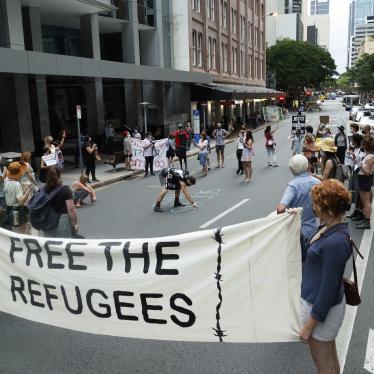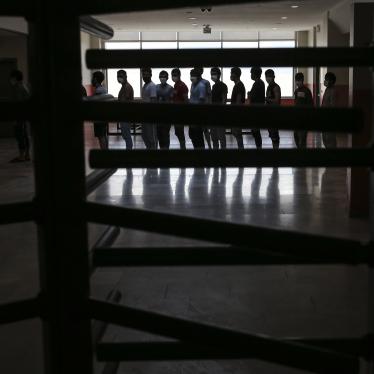(New York) – The Pakistan government should immediately order local authorities to stop pressuring registered refugees to return to Afghanistan.
The Pakistan government has an obligation to protect all Afghans in the country, including those not registered as refugees, from harassment and other abuses, Human Rights Watch said. A recent increase in Afghans repatriating from Pakistan appears related to coercive pressure from local governments on Afghans to return to their country since the December 16, 2014 attack by the Pakistani Taliban splinter group Tehreek-e-Taliban (TTP) on a school in Peshawar in northwestern Pakistan. The attack left at least 148 dead – almost all of them children.
“Pakistani officials should not be scapegoating Afghans because of the Taliban’s atrocities in Peshawar,” said Phelim Kine, deputy Asia director at Human Rights Watch. “It is inhumane, not to mention unlawful, to return Afghans to places they may face harm and not protect them from harassment and abuse.”
Nine times as many Afghan refugees were repatriated from Pakistan in January 2015 as in December 2014, according to the UN refugee agency (UNHCR). UNHCR analysis of the returns indicated that a significant percentage of these 3,829 returns were coercive. Nearly all of the refugees returned from three Pakistani provinces – Khyber Pakhtunkhwa, Azad Kashmir, and Punjab – where an increase in arrests, detentions, and evictions of Afghans were reported during the same period.
Those registered as refugees possess Proof of Registration (PoR) issued by the Pakistani government, with the support of UNHCR. Although UNHCR reports a decrease in the number of PoR cardholders returning to Afghanistan since the last week of January 2015, International Organization for Migration (IOM) figures show a comparable rate of returns of undocumented Afghans in the first two weeks of February compared with January.
The overwhelming majority of Afghans who have left Pakistan since December 16, 2014, have not been formally deported, but are rather categorized as “spontaneous returns.” The IOM reported that more than 33,000 undocumented Afghans had “spontaneously returned” from Pakistan from the beginning of 2014 through the first two weeks of February 2015, a 155 percent increase from all spontaneous returns through the end of 2014.
The rate of spontaneous returns of undocumented Afghans increased from an average of 59 a day in 2014 to 749 in the first six weeks of 2015. An IOM official told Human Rights Watch that many of the unregistered Afghan returnees reported that they had left Pakistan to escape harassment following the Peshawar attack.
In December 2014, the Pakistani government specifically assured Afghan refugees that the Peshawar attack would not prompt any official reprisals. The Ministry of States and Frontier Regions pledged that the government would “maintain its traditional hospitality” toward Afghan refugees. Despite these assurances, since December 16 there have been numerous reports of government and public harassment and intimidation against the country’s Afghan population.
Those reports include accounts that police have threatened Afghans with arrest unless they leave the country immediately. The Hangu district government in Khyber Pakhtunkhwa province announced on February 11, 2015, that it would require all registered Afghan refugees to relocate to a government-supervised camp and that it would deport any undocumented Afghan citizens.
Afghanistan currently produces the second-largest number of refugees in the world, after Syria. The armed conflict between the Taliban and the Afghan government and its international backers has added considerably to the millions of Afghans who became refugees since the 1980s. Pakistan has hosted about 1.5 million registered Afghan refugees for more than 30 years, while another 1 million unregistered Afghans live in the country.
The Pakistani government, with the support of UNHCR, previously issued Proof of Registration (PoR) cards to Afghan refugees, which authorized their legal residence and other benefits. The government has extended until December 2015 the status of refugees who were PoR cardholders in 2012 and has instructed Pakistan’s provincial governments and law enforcement agencies not to harass Afghan refugees waiting for the issuance of updated PoR cards. With the exception of children of PoR cardholders, however, who are entitled to their own cards after reaching age 5, no new PoR cards are being issued. This means that newly arriving Afghans who might need protection are prevented from lodging asylum claims or otherwise registering as refugees.
The Pakistani government has legitimate authority to deport undocumented migrants but should give those who might fear persecution upon return the opportunity to lodge asylum claims, and otherwise treat them with dignity. The IOM reported that the Pakistani government had deported more than 2,200 Afghans since the beginning of 2015, more than half as many as those deported in all of 2014.
Pakistan is not a party to the 1951 Refugee Convention. Human Rights Watch considers that the absence of a mechanism to register refugees or to allow people to file asylum claims means that Pakistan could be violating the customary international law prohibition on refoulement – the forcible return of a refugee – when it summarily returns unregistered Afghans. The fact that registered refugees are telling UNHCR that they left Pakistan as result of coercion suggests that so-called constructive refoulement is already occurring.
“Pakistan’s government is tarnishing the country’s well-deserved reputation for hospitality toward refugees by tolerating the punitive and potentially unlawful coercive repatriation of Afghan refugees,” Kine said. “The government needs to defend the rights of its Afghan population and ensure that local authorities aren’t carrying out vindictive reprisals for an atrocity the Afghan refugees bear no responsibility for.”







